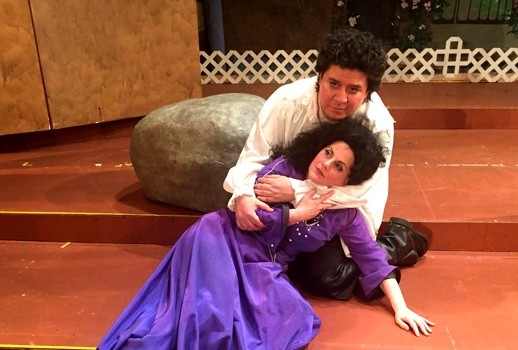
For these accomplishments, I admire the company. It’s not always easy to access live opera due to the costs and availability of the medium—the Met’s Live in HD initiative is another tactic, deployed by a much wealthier, established company. However, Regina Opera offers performances for very affordable prices, with simple, straightforward productions that earnestly seek to serve the music.
Which is to say, the company produces community opera. And I mean that in the best sense of the word. While venues such as Lincoln Center, Carnegie Hall, and BAM conceive of themselves as players on an international level, Regina Opera draws its energy from local interests and passions. Consequently, the company lacks a professional ethos, favoring instead a familiar, laid-back approach. And this notion of opera as a parochial, accessible practice is certainly a welcomed antidote to the toxic intersections of opera and class.
As a critic, though, I would be doing the company a disservice by simply congratulating them on their objectives—however admirable those objectives may be—because Regina Opera advertises itself as a professional company, based in NYC. Within this rubric, the performance of Manon Lescaut, at the auditorium of Our Lady of Perpetual Help in Brooklyn, was problematic in very fundamental ways, the most egregious being the overall poor intonation of the orchestra, conducted by Gregory Ortega.
With the deep field of talent available in New York City, it’s difficult to understand how an orchestra can be so poorly prepared. To be clear, this was not a case of the strings veering sharp for a few bars—this was a performance that went out of tune on a global scale, practically every phrase marred by poor playing.
In the wake of this troubling aspect, it’s difficult to judge a production that strived so genuinely to honor Puccini’s music. The opera, based on the novel by Abbé Prévost, charts the social, moral, and physical unraveling of a young 18th century woman in the arms of Des Grieux, a sexy nobleman. From her entrance in a square at Amiens, to the elegance of Paris, to the vast wasteland of America, Manon Lescaut, in its exploration of extremes, offers the somewhat sexist, cautionary tale of what happens to women who so easily succumb to passion. As such, it gives little traction for the audience to orient itself to Manon’s dilemma.
Consequently, Manon presents an odd challenge for the singing actress—the character’s capricious behavior tends to confound our perceptions of her motivations. Indeed, manipulated and objectified by the men surrounding her, Manon is more often spoken about, or to, than given freedom to articulate her own sense of what her position is in within the narrative’s plot. Luckily, her two famous arias “In quelle trine morbide” and “Sola, perduta, abbandonata” allow the audience access to this obscured interiority.
In the title role, Sabrina Palladino, was a serviceable, committed Manon, which brought a helpful, cohesive quality to the opera’s dramatic trajectory. Her voice, beautiful and rich in the middle and lower register, only faltered at the most extreme sections of the role.
As her Des Grieux, Percy Martinez managed to get through the role without incident. However, his tenor sounded slightly lodged in the throat, and his singing rarely achieved gestures of bloom and ease, disguising stridency as passionate ardor. It was only during the final act, as the character’s desperation bubbled to the surface, that Martinez’s singing became potent and vital.
The most vocally secure performance came from Nathan Matticks in the thankless role of Lescaut. The singer possessed a sonorous, full-voiced baritone, which he used effectually. However, while his singing indicated technical maturity, his acting remained one-dimensional—an aspect, perhaps, of the role’s reductive function within the plot.
The rest of the cast provided inconspicuous support. Of special note were David Bailey as Edmondo, John Schenkel as Geronte di Ravoir, and Noelle Currie as the Madrigal Singer. And the chorus, sounding rich and well-rehearsed, provided a much-needed counterbalance to the orchestra’s poor intonation.
Linda Lehr’s stage direction, perfunctory and uninspired, remained entirely within the confines of a traditional iteration. In contrast to the Met’s recent pointlessly anachronistic production, this conservatism was somewhat welcomed. However, marred by the musician’s poor playing, Puccini’s musical drama rarely took flight.
While reflecting on these criticisms, I fear that Regina Opera may have a general misunderstanding of its value as an institution. Attending a production by the company was not at all like attending the Met. Neither was it like the more recent hipster opera startups (such as LoftOpera or Heartbeat Opera) that have been making waves.
It was, instead, like participating in a true community event—informal, full of warmth, where everyone is on a first-name basis. Even local children were involved, serving as choristers and supers. This connectivity made me wonder if the criteria by which I judged the performance were a little skewed—like going to the town softball game and expecting Yankee Stadium.
Regina Opera is not the Met, nor is it on par with the smaller companies that have recently cropped up around the city. The latter are professional companies that operate with a professional ethos. But, Regina Opera does offer something that I find lacking in those companies: opera performance as a local practice. And it is this orientation that I find most remarkable and, in some ways, most necessary.
In my hometown, I grew up playing little-league baseball. It would have been nice to have the chance to do opera instead.
Photo by Gregory Ortega.



